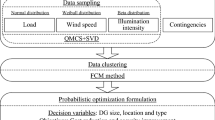Abstract
In this paper, a power allocation problem based on the Cournot game and generalized Nash game is proposed. After integrating dynamic average consensus algorithm and distributed projection neural network through singular perturbation systems, a normalized Nash equilibrium seeking algorithm is presented to solve the proposed power allocation problem in a distributed way. Combine Lyapunov stability with the singular perturbation analysis, the convergence of the proposed algorithm is analyzed. A simulation on IEEE 118-bus confirms that the proposed distributed algorithm can adjust the power allocation according to different situations, while keeping the optimal solution within the feasible set.
Similar content being viewed by others
References
Zhao M, Shen C, Liu F, et al. A game-theoretic method for prediction of microgrid growing trends in China. Sci China Tech Sci, 2015, 58: 1760–1766
He X, Ho D W C, Huang T, et al. Second-order continuous-time algorithms for economic power dispatch in smart grids. IEEE Trans Syst Man Cybern Syst, 2018, 48: 1482–1492
Yu Y X, Zeng Y, Liu H, et al. Challenges and R&D opportunities of smart distribution grids in China. Sci China Tech Sci, 2014, 57: 1588–1593
Hu X, Liu Z W, Wen G, et al. Branch-wise parallel successive algorithm for online voltage regulation in distribution networks. IEEE Trans Smart Grid, 2019, 10: 6678–6689
Li C, Xu Y, Yu X, et al. Risk-averse energy trading in multienergy microgrids: A two-stage stochastic game approach. IEEE Trans Ind Inf, 2017, 13: 2620–2630
Liu N, Yu X, Wang C, et al. Energy sharing management for micro-grids with PV prosumers: A stackelberg game approach. IEEE Trans Ind Inf, 2017, 13: 1088–1098
Park S, Lee J, Bae S, et al. Contribution-based energy-trading mechanism in microgrids for future smart grid: A game theoretic approach. IEEE Trans Ind Electron, 2016, 63: 4255–4265
Liang Y, Liu F, Mei S. Distributed real-time economic dispatch in smart grids: A state-based potential game approach. IEEE Trans Smart Grid, 2018, 9: 4194–4208
Martimort D, Stole L. Representing equilibrium aggregates in aggregate games with applications to common agency. Games Economic Behav, 2012, 76: 753–772
Martimort D, Stole L. Aggregate representations of aggregate games. Munich Personal RePEc Archive, 2011. Item ID: 32871
Jensen M K. Aggregative games and best-reply potentials. Econ Theor, 2010, 43: 45–66
Koshal J, Nedić A, Shanbhag U V. A gossip algorithm for aggregative games on graphs. In: Proceedings of the IEEE Conference on Decision and Control (CDC). Maui, 2012. 4840–4845
Liang S, Yi P, Hong Y. Distributed Nash equilibrium seeking for aggregative games with coupled constraints. Automatica, 2017, 85: 179–185
Ye M, Hu G. Game design and analysis for price-based demand response: An aggregate game approach. IEEE Trans Cybern, 2017, 47: 720–730
Parise F, Gentile B, Lygeros J. A distributed algorithm for average aggregative games with coupling constraints. ArXiv: 1706.04634
Debreu G. A social equilibrium existence theorem. Proc Natl Acad Sci USA, 1952, 38: 886–893
Pang J S, Fukushima M. Quasi-variational inequalities, generalized Nash equilibria, and multi-leader-follower games. Comput Manage Sci, 2005, 2: 21–56
Facchinei F, Kanzow C. Penalty methods for the solution of generalized nash equilibrium problems. SIAM J Optim, 2010, 20: 2228–2253
Fukushima M. Restricted generalized Nash equilibria and controlled penalty algorithm. Comput Manag Sci, 2011, 8: 201–218
Nabetani K, Tseng P, Fukushima M. Parametrized variational inequality approaches to generalized Nash equilibrium problems with shared constraints. Comput Optim Appl, 2011, 48: 423–452
Zhu M, Frazzoli E. Distributed robust adaptive equilibrium computation for generalized convex games. Automatica, 2016, 63: 82–91
Yi P, Pavel L. A distributed primal-dual algorithm for computation of generalized Nash equilibria with shared affine coupling constraints via operator splitting methods. ArXiv: 1703.05388
He X, Yu J, Huang T, et al. Distributed power management for dynamic economic dispatch in the multimicrogrids environment. IEEE Trans Contr Syst Technol, 2019, 27: 1651–1658
Pang J S, Fukushima M. Quasi-variational inequalities, generalized Nash equilibria, and multi-leader-follower games. Comput Manage Sci, 2005, 2: 21–56
Rosen J B. Existence and uniqueness of equilibrium points for concave n-person games. Economet: J Economet Soc, 1965, 33: 520–534
Liu Z W, Yu X, Guan Z H, et al. Pulse-modulated intermittent control in consensus of multiagent systems. IEEE Trans Syst Man Cybern Syst, 2017, 47: 783–793
Liu Z W, Guan Z H, Shen X, et al. Consensus of multi-agent networks with aperiodic sampled communication via impulsive algorithms using position-only measurements. IEEE Trans Automat Contr, 2012, 57: 2639–2643
Liu Z W, Wen G, Yu X, et al. Delayed impulsive control for consensus of multiagent systems with switching communication graphs. IEEE Trans Cybern, 2019,: 1–11
Tan Y, Nešić D, Mareels I. On non-local stability properties of extremum seeking control. Automatica, 2006, 42: 889–903
Menon A, Baras J S. Collaborative extremum seeking for welfare optimization. In: Proceedings of the IEEE 53rd Annual Conference on Decision and Control. Los Angeles, 2014. 346–351
Fukushima M. Equivalent differentiable optimization problems and descent methods for asymmetric variational inequality problems. Math Programming, 1992, 53: 99–110
Power systems test case archive.118bus power flow test case. Illinois Center for a Smarter Electric Grid (ICSEG). https://icseg.iti.illinois.edu/ieee-118-bus-system/
Author information
Authors and Affiliations
Corresponding author
Additional information
This work was supported by the National Natural Science Foundation of China (Grant No. 61673107), and the Jiangsu Provincial Key Laboratory of Networked Collective Intelligence (Grant No. BM2017002).
Rights and permissions
About this article
Cite this article
Fu, Z., Yu, W., Lü, J. et al. A distributed normalized Nash equilibrium seeking algorithm for power allocation among micro-grids. Sci. China Technol. Sci. 64, 341–352 (2021). https://doi.org/10.1007/s11431-019-1538-6
Received:
Accepted:
Published:
Issue Date:
DOI: https://doi.org/10.1007/s11431-019-1538-6




